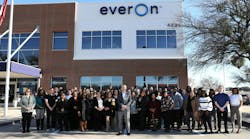WASHINGTON , Dec. 4 /PRNewswire-USNewswire/ -- The Homeland Security & Defense Business Council and the Georgetown Public Policy Institute today held a transition briefing to discuss the historical context of the U.S. Department of Homeland Security, the evolution of the homeland security mission, and recommendations to the Obama Administration for where the Department should go from here.
"Although we are certainly doing better, we are not there yet," said Greg Pellegrino , Chair of the Homeland Security & Defense Business Council and Global Managing Director at consulting giant Deloitte. "Speed and openness is the enemy of security and after 9/11 we responded very rapidly. We are still navigating the balance between openness and protection."
Pellegrino, one of several industry leaders who advised and counseled the Department in its early stages joined Pat Schambach , Vice President & General Manager, Homeland Security Area, CSC and former Associate Undersecretary & CIO, Transportation Security Administration; and Christian Beckner , Professional Staff Member, Senate Homeland Security & Governmental Affairs Committee on a panel moderated by Gary Shiffman , Ph.D., Director of Homeland Security Studies, Center for Peace and Security Studies,
"When we first stood up the Transportation Security Administration, our greatest challenge was to assure protection in an environment where commerce was being conducted," said Schambach. "The mission was to build public confidence and achieve a balance between the openness we are used to with the security necessary to protect our citizens." Schambach was one of the founding members of TSA and its first CIO months after legislation creating TSA was passed.
"Integration remains a huge challenge and the success of the collaboration needed will depend on how much President-Elect Obama will insist on - all the various components of the Department will have to work together and some tough decisions will have to be made," Schambach continued. "From so many networks and systems with 40 passwords to access all the federal systems, information sharing among many other areas seem overwhelming - the new administration must develop a strategy to review all of these systems and simplify information integration," added Christian Beckner .
Panelists addressed several substantive questions and commented on the separation of the Federal Emergency Management Agency from DHS, whether the National Security Council and the Homeland Security Council should merge, and what role industry plays and should play in the future of "homeland security."
"The answer of whether we invest in prevention or just accept that things will happen is an evolution - mistakes like the nation's response to Katrina only benefit us when we learn," said Pellegrino. Continued Beckner, "We've seen FEMA improve and respond better to recent hurricanes and separating their function from DHS breaks the linkages that have been created and disrupts the continuum of prevention, preparedness and response that is critical to any incident."
Speakers indicated that this continuum has evolved and to some extent integrated the private sector and its numerous contributions to homeland security. "Industry owns 85% of the infrastructure - and that is true around the globe - local business, small to medium companies, non-profits play a critical role in first line response," said Pellegrino. "People relate to their communities first. Additionally, innovations such as the electric notification system that most schools use are simple, consumer oriented capabilities that help organize people and tell them what they should be doing. Right now they are employed to tell you what your kid's eating for lunch but in an emergency those systems will be called upon to get critical information to parents and others in the community. These seemingly innocuous innovations have come from the private sector and have very meaningful homeland security implications."
The full event will be available at www.homelandcouncil.org December 16th .
The Homeland Security & Defense Business Council is a non-profit, non-partisan corporate membership organization of the nation's leading corporations engaged in the homeland security mission. The Council's mission is to serve as a conduit to build stronger and more meaningful relationships between senior leadership in the public and private sectors. The Council's vision is to create a seamless continuum of preparedness and a foundation of resiliency that utilizes the resources and expertise of the private sector to coordinate more effectively with the public sector. For more information, please visit: www.homelandcouncil.org.
SOURCE Homeland Security & Defense Business Council


